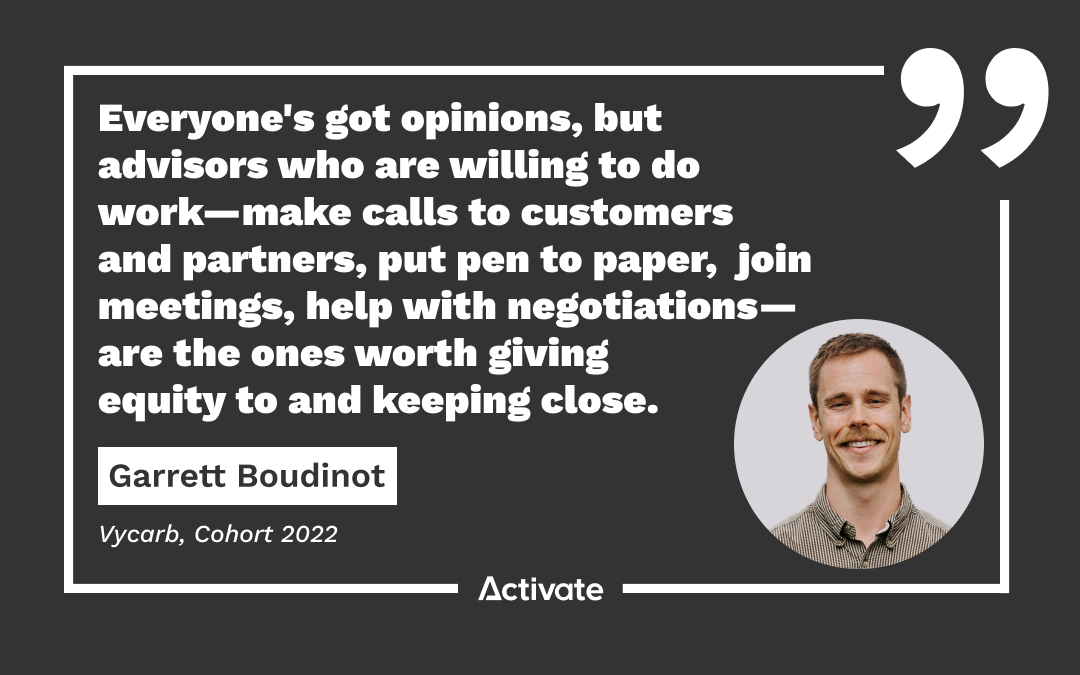Assembling an All-Star Team of Advisors: Where to Start
March 27, 2024
When it comes to achieving your goals, “Surround yourself with people who you trust, and who are there to support you and shape your success,” says Rok Sitar (Blaze Energy Technologies, Cohort 2023). This is universally sound advice, and chances are you already have a select cadre of mentors or advisors to whom you’ve turned for guidance during your education and career.
For up-and-coming entrepreneurs, this advice takes on new significance as you assemble a board of advisors to bolster your success.
So, what is a board of advisors? Not to be confused with a board of directors, which you’ll establish later on, it is a group of individuals with expertise and experience germane to your path. During their time as advisors, they provide help with the myriad decisions you’ll face once you make the leap and launch a venture.
Assessing your needs
Advisors often fill in the gaps in your budding company, so start by analyzing the strengths and weaknesses you will bring to this venture. Think about your experience, skills, knowledge, and networks. From there, finding advisors is an exercise of filling in areas of weakness.
According to Activate’s Science Innovator’s Handbook, there are four essential elements on which any hard-technology venture fails or succeeds:
The functionality of the technology
A ready and viable market for that technology
A sustainable financing model to grow the venture
A strong core team that can keep those three elements moving in the right direction
How do these elements play into your company’s strengths and weaknesses?
Where to find advisors
When seeking out advisors, it’s worthwhile to cast a wide net.
Sitar has connected with advisors through both his local community and the Activate network, which he calls “one of the greatest assets of Activate Fellowship.” Other Activate Fellows have found advisors through their local ecosystems, pitch competitions, the I-Corps program, and more.
What does this outreach look like? For Garrett Boudinot (Vycarb, Cohort 2022), sometimes it’s putting out a specific call, “just like a job opening.” His network tends to be very responsive and he has cultivated a slew of connections this way. Other times, the stars aligned right when there was a need in his company, he says. “A person looking to contribute came into our network, we slowly created a relationship, and then recognized an advising relationship would add value to both of us.”
When vetting possible advisors, Alexis Harroun (Juno Propulsion, Cohort 2023) typically starts with an intro call. “It helps if there’s an agenda, like doing market research,” she says. “I try to spend a good amount of time learning more about them and their background and trying to find a personal connection.”
Patrick Sullivan (Flux XII, Cohort 2023) echoes that authenticity is key. “In my experience, the key to finding advisors has been just sharing my mission and passion,” he says. “If people see that you are genuinely driven to learn and make a positive impact, and also have an exciting innovation, many will be willing to help.”
Why (and why not) to choose an advisor
What differentiates a great advisor from a not-so-great one? They put in real work, says Boudinot.
“Everyone's got opinions, but advisors who are willing to do work—make calls to customers and partners, put pen to paper, join meetings, help with negotiations—are the ones worth giving equity to and keeping close,” Boudinot says.
What are some reasons not to choose an advisor?
Sitar cautions against choosing someone just because they have a flashy resume. Instead, he strongly suggests prioritizing people you trust.
Harroun recommends confirming that the individual will have adequate bandwidth. “Even if they seem like a perfect advisor, they may not have the time to help you,” she says. “I would say at a very early stage, your advisors should be helping for free with no equity and open to meeting once every two to three weeks for 30 minutes.”
Lastly, avoid the pitfall of rushing. Looking back, Harroun says she felt pressured to lock in advisors quickly to establish credibility for her company. Instead, she wishes she had taken more time to explore her options. Sitar agrees. “There are many awesome people out there, and you do not have to surround yourself with people just because they knocked on your door first,” he says.
The impact of all-star advisors
Activate Fellows can attest to the power of having a well-rounded board of advisors.
“My advisors help fill in the gaps in areas I’m not as familiar with,” says Harroun. “I’ve had some of my best insights after brainstorming with them.”
Boudinot says his advisors have been critical when it’s time for his company to punch above its weight. “Our advisors are older and more experienced than our team and have dealt with investors/corporate partners/customers a million times, so having their experienced voice in the room—and image of experience—is really helpful,” he says. In these moments, the Vycarb team also benefits by learning from how the advisors do things.
Sitar’s advisors have helped Blaze Energy Technologies in innumerable ways, he says, “But the most important one so far is to push me to do things that are outside of my comfort zone.”
For more tips on finding advisors and launching your science-based venture, download Activate’s Science Innovator’s Handbook.




